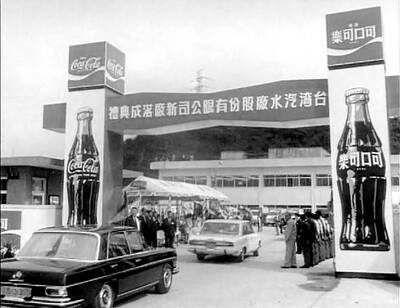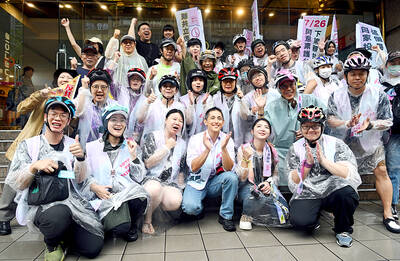Sunday afternoon at @live from 1pm to 5pm, 10 of Taiwan's top DJs will spin, scratch and mix authentic vinyl LPs as they battle for mad props, high-end Vestax sound mixers and a top prize of NT$10,000. That's right. They will be using turntables. They will be using 12-inch records. They will not be using CD players and sound boards. Finally, DJs in Taiwan who do more than hit "play."
The event, a first ever, is called 2001 Taiwan DJ Competition and is sponsored by Multiply Trading (

PHOTO COURTESY OF VESTAX
"We know it's been all CD decks here in the past, but we're trying to change that," said organizer Chang A-yuan (
For inspiration, the competition calls predominantly on hip hop music, which Chang said is the major sourcebook from which the scratch battlers will draw.
Though there are still relatively few DJs in Taiwan with genuine scratching skills, Chang said the contest has attracted the best turntablists on this island, including DJ Guangtou (
The competition program will consist of five- to 10-minute scratch sets per contestant. For gear, organizers will provide top-of-the-line Vestax PDX-2000 turntables hooked into a Vestax PMC-07PROA mixer. There will also be performances by Japanese judges Tashi and Takada and by Taiwan's major purveyor of hip hop, MC Hotdog. Filling up the affair's prelude, postlude and other downtime, organizers will show Vestax videos of turntable techniques from around the world.
Total prizes for the afternoon will amount to NT$27,000 in cash and approximately double that value in five Vestax mixers. In addition, the grand champion master scratcher will be sent on to an international DJ battle in Los Angeles later this year.
Admission for the event is NT$500. Though the price is steep and Sunday afternoon is a strange time for a club-style party, Chang's not concerned.
"We're not doing this to earn money," he said. "We're just doing this for ourselves and the DJs. Even if nobody shows up, we don't care. We'll just party by ourselves."What: 2001 Taiwan DJ Competition (刮片擂台賽)
When & Where: 1pm to 5pm on Sunday at @live, 15 Hoping E. Rd., Sec. 1 (和平東路一段15號)
Tickets: NT$500

July 28 to Aug. 3 Former president Chiang Kai-shek (蔣介石) reportedly maintained a simple diet and preferred to drink warm water — but one indulgence he enjoyed was a banned drink: Coca-Cola. Although a Coca-Cola plant was built in Taiwan in 1957, It was only allowed to sell to the US military and other American agencies. However, Chiang’s aides recall procuring the soft drink at US military exchange stores, and there’s also records of the Presidential Office ordering in bulk from Hong Kong. By the 1960s, it wasn’t difficult for those with means or connections to obtain Coca-Cola from the

No one saw it coming. Everyone — including the Chinese Nationalist Party (KMT) — expected at least some of the recall campaigns against 24 of its lawmakers and Hsinchu Mayor Ann Kao (高虹安) to succeed. Underground gamblers reportedly expected between five and eight lawmakers to lose their jobs. All of this analysis made sense, but contained a fatal flaw. The record of the recall campaigns, the collapse of the KMT-led recalls, and polling data all pointed to enthusiastic high turnout in support of the recall campaigns, and that those against the recalls were unenthusiastic and far less likely to vote. That

Taiwan is today going to participate in a world-first experiment in democracy. Twenty-four Chinese Nationalist Party (KMT) lawmakers will face a recall vote, with the results determining if they keep their jobs. Some recalls look safe for the incumbents, other lawmakers appear heading for a fall and many could go either way. Predictions on the outcome vary widely, which is unsurprising — this is the first time worldwide a mass recall has ever been attempted at the national level. Even meteorologists are unclear what will happen. As this paper reported, the interactions between tropical storms Francisco and Com-May could lead to

A couple of weeks ago the parties aligned with the People’s Republic of China (PRC), the Chinese Nationalist Party (KMT) and the Taiwan People’s Party (TPP), voted in the legislature to eliminate the subsidy that enables Taiwan Power Co (Taipower) to keep up with its burgeoning debt, and instead pay for universal cash handouts worth NT$10,000. The subsidy would have been NT$100 billion, while the cash handout had a budget of NT$235 billion. The bill mandates that the cash payments must be completed by Oct. 31 of this year. The changes were part of the overall NT$545 billion budget approved